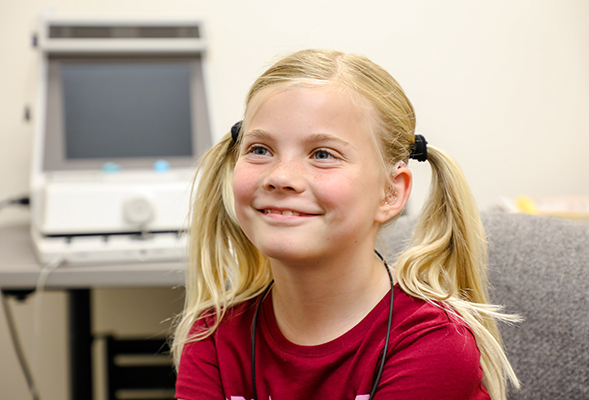Lara's Ears: A Community Partnership to Improve Learning
SDSU's audiology clinic, San Diego schools and a local non-profit are collaborating to provide hearing aids for kids, improving classroom learning.

“The thing that is very frustrating about hearing aids for kids is health insurance doesn’t pay for it.”
There’s sparkling glitter in the gold earpieces of Lara’s two hearing aids, a shade she picked to match her blonde hair. No trendy neon or bold primary colors for this 8-year-old.
Lara has been using them since kindergarten, after her mild to moderate hearing loss was first diagnosed. Now they help her understand her teacher at Albert Einstein Academy Charter School, where she sang—in German—for an afterschool musical production of “The Rusty Knight” while she was in second grade this past year.
Good hearing aids can cost $3,000 or more, and Lara needs two of them. Under a partnership of the San Diego State University Audiology Clinic, the San Diego Unified School District (SDUSD) and Assistance League Greater San Diego (ALGSD), however, her family obtained them for free.
Developed by the non-profit ALGSD, “Operation Loaner Hearing Aids” so far has provided 40 long-term hearing aids to families who qualify for the program based on income. Some 34 additional hearing aids have been distributed on a short-term basis, often for kids whose own devices are in the shop for repairs.
Christy Kirsch, director of the audiology clinic operated by SDSU’s School of Speech, Language, and Hearing Sciences, said the loaner program serves a “gap group” of families that don’t qualify for help from California Children’s Services or Medi-Cal, but would have to struggle to pay for quality hearing aids by themselves.
The clinic examines children referred to them by the school district and ALGSD, fits them with hearing aids, fine-tunes them and then sees them two to three times a year for tests and any needed adjustments and for new ear molds, the part that holds the device in the ear. ALGSD reimburses SDSU for the cost of the hearing aids, obtained at a discount, through its own fundraising.
Donna Royce, educational audiologist for San Diego Unified, said the district couples the loaners with its own classroom technology to further improve amplification and learning. In some schools, for instance, the teacher wears a microphone which transmits their voice directly to the students' hearing aids. Now, newer technology allows them to stream directly to the hearing aids without attaching an external receiver or wearing a device around the neck.
“One of my (students) was first identified with hearing loss in fifth grade which is a tough time to be identified,” Royce said. “San Diego State was just phenomenal in looking at the technology, what would be best for her.”
The technology is constantly improving, Royce said, and it’s not unusual for users to want a newer model every three to five years.
“The thing that is very frustrating about hearing aids for kids is health insurance doesn’t pay for it,” said Carol Fischer, an SDSU graduate and retired teacher from SDUSD’s Deaf and Hard-of-Hearing Program who led the creation of the loaner program about five years ago. (Let California Kids Hear, an organization lobbying for legislation requiring health insurance to cover hearing aids for children, says only 25 states currently do so.)
Even for families that have insurance coverage, Royce said, repairs and replacements sometimes can take months and even up to a year.
Located along Campanile Drive, the audiology clinic serves the entire community, infants to elderly. Audiology students treating hearing loss learn as they are assisted in their work by trained professionals, and their clients “enjoy being part of the teaching process,” Kirsch said. “It’s almost like a secret that we’re here.”
Among those assisted by the loaner program is Melanie Grotegut of San Diego’s Bay Ho neighborhood. Grotegut said hearing tests conducted when her daughter Lara was born didn’t identify the mild loss, ultimately traced to a genetic mutation. Lara’s younger brother, Marc-Mael, also has hearing loss and receives care at the audiology clinic.
“The help that we got from SDSU and the Assistance League was very, very helpful for our family,” Grotegut said during a recent visit. For Lara, she said, “it makes a huge difference academically” and in how quickly she responds to her teachers.
Lara is shy around people she has just met, so she handled questions about how the hearing aids help her tune into the world around her with nods and glances toward mom for help.
Does the link to a microphone her teacher wears help her hear lessons? A nod yes. Does she use the volume control switch to reduce noise at lunch time? Yes. Can she still hear a whisper? Another yes.
Carol Mackersie, co-director of the SDSU audiology program, said students with hearing loss can fall far behind in school even if they’re not completely deaf.
“Their education really suffers,” Mackersie said. “It affects speech and language development. Being able to hear the teacher, being able to learn, is very much impacted by hearing loss.”
Technically the hearing aids are loaners, but Mackersie said there’s an understanding some families need to keep them indefinitely.
Fischer, previously an itinerant teacher in SDUSD who tested students with special needs, said “when I retired, it was something I really felt strongly about.” The program became part of an ALGSD mission that includes school uniforms, clothing, shoes, and hygiene kits for elementary school children.
The reimbursements paid to SDSU for the hearing aids come from revenues from the 200-member group’s Hillcrest thrift shop and its other fundraising, including grants from the Lions Club and San Diego Downtown Rotary Club. The program is targeted to families with annual incomes between $40,000 and $70,000 with children enrolled in SDUSD.
For additional information on the loaner program, San Diego Unified School District families can contact Donna Royce by email at [email protected]



